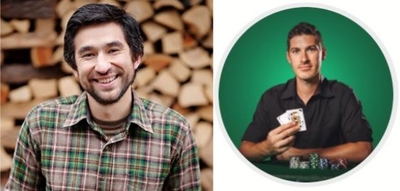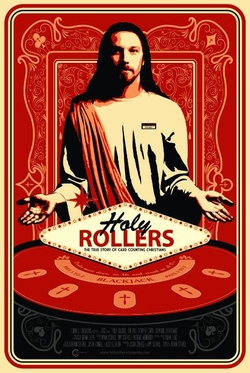 When Ben Crawford took a few books with him to bible camp in 2002, he could never have imagined what it would lead to.
When Ben Crawford took a few books with him to bible camp in 2002, he could never have imagined what it would lead to.
The books he read were written by Stanford Wong, so they were all about the game of blackjack and how to beat the casinos.
Inspired by this, Ben decided to try and beat some of the local casinos in Seattle, and told his friend and fellow bible camp attendee, Colin Jones, who also happened to be a maths grad.
Colin loved the idea too, and before long the duo had taught themselves to count and were honing their skills in the casinos.
Seattle is in Washington, which isn’t exactly a Mecca for gamblers and card counters, so they had the advantage of being perhaps the only people in the area counting cards. This meant the casinos weren’t really on the lookout for card counters, and they managed to play for a long time without being backed off.
They started off with $11,000 and managed to turn it into more than $100,000, before the back offs started to come and they had to think about playing elsewhere.
Call it divine fortune if you like, but at around the same time a fellow church attendee got wind of what they were doing and asked if he could play for them.
They agreed, and things really snowballed.
Shepherding Their Flock
 It was in 2006 that the Church Team was officially formed.
It was in 2006 that the Church Team was officially formed.
That first enthusiastic church goer had turned into nine, so Ben and Colin switched roles and instead of playing themselves, they trained their apprentices who went out and played on their behalf.
The church is a real community, so word got around very quickly from here. Someone told their wife, who told her brother, who told his pastor, and so on. Before long the team had grown even further, with members in the neighbouring state of Oregon and further South in Nevada and California – they even had a contingent way out East in Cincinnati, Ohio, and some members as far away as New York.
Many more friends and associates who didn’t play themselves were investors in the team, giving their money over to be played with and then sharing in the returns. The players themselves would invest too, even taking equity from their homes and borrowing on credit cards to do so (Not recommended!).
While great at first – they took $1.58 million in 2007 and at least $1.3 million in 2008 – this soon became very difficult to manage as the number of players grew and the quality of those players began to dip.
They had hit their peak, and on the other side was a long fall downwards.
A Judas Among Them?
 As well as being difficult to manage, the bloated team was running into other issues.
As well as being difficult to manage, the bloated team was running into other issues.
To maintain quality and standards, there was a quarterly team meeting in Seattle and attendance was mandatory.
While there, players would be tested to ensure their skills were up to scratch but people started failing these exams, so Ben and Colin had the unpleasant responsibility of kicking them out of the team.
Resentments grew, as did the pressure, and some players were struggling with their nerves when being backed off by the casinos.
Some worse costumes, some ran away, some just felt uncomfortable carrying increasingly large amounts of cash across the country.
All of these things cumulatively resulted in more and more players being discovered as card counters and then kicked out and banned from casinos.
To add to these issues the team ended up on a $465,000 losing streak, and worse still, accusations of stealing were being thrown about.
It’s hard to know if a player is telling the truth when they report winning $10,000; maybe they actually won $12,000 but kept $2k to themselves? This would be impossible to prove, but with all of the others stresses and tensions at the time people’s nerves began to fray.
They also had to deal with the judgements of others who disapproved of what they were doing, not to mention their own internal conflicts.
Morality Struggles

Being religious, Ben, Colin and the other members of the Church Team had another hurdle to negotiate during their card counting journey.
Their own morality.
Was counting cards justifiable? Was it gambling? Most religious people see gambling as a bad thing, especially in America. What’s more, many believe that the work you do should in some way do some good, and leave the world in a better place than you found it. Does card counting achieve this?
Ultimately, this mental wrangling was one of the things that caused to team to stop playing, but in the meantime, they rationalised that since they were using math to beat the game, they weren’t actually gambling at all.
Not only that, but by working around 40 hours per month and earning enough in that time to live, they could dedicate the rest of their time to the church, and many of the team were pastors or church leaders so this time was valuable.
That took care of part of the issue, but what about the pursuit of money?
It may seem hypocritical since the church is one of the richest organisations in the world, but the pursuit of money is not generally seen as a good thing in religious circles.
“For the love of money is a root of all kinds of evils. It is through this craving that some have wandered away from the faith and pierced themselves with many pangs.” – Timothy 6:10
Eventually, the team consoled themselves that they were actually doing a good thing by taking money from an ‘evil enterprise’ that might use it for ‘ill purposes’, and then giving some of that money to the church.
Make of that what you will.
Losing the Faith
 After around 6 years of taking down the casinos, and after all the highs and lows, the people at the head of the team were losing interest and moving onto other things.
After around 6 years of taking down the casinos, and after all the highs and lows, the people at the head of the team were losing interest and moving onto other things.
They had also seen first hand that the team could not be scaled any further without an awful lot of upheaval and risk, so they started to focus on different business ideas.
On top of this, many of the players who had joined the team at the beginning had moved on, and there was lingering bad blood over the stealing accusations and having to kick people out to maintain quality.
The team really didn’t feel like the same positive group of trusted players anymore, so Ben and Colin eventually disbanded the Church Team, or the Holy Rollers as they have become known, in 2011.
They had taken between $3-4 million from casinos in their time together, had made a lot of their friends and associates much more financially comfortable, not to mention donating an awful lot of money to the church.
And all because someone bought a few books to take to bible camp.
The Afterlife
 Despite no longer playing themselves, Ben and Colin went on to create a blackjack training course and website with training videos and live mentoring, passing on the skills they had learned while playing.
Despite no longer playing themselves, Ben and Colin went on to create a blackjack training course and website with training videos and live mentoring, passing on the skills they had learned while playing.
For a fee, of course.
Now, instead of earning money from the casinos they are earning it from would be card counters. Again, make of that what you will.
On top of this, in the same year the team disbanded they released a documentary called Holy Rollers, directed and produced by a childhood friend of Colin, who had been following the team for a number of years.
The timing was excellent, and helped to gain a lot of attention for the founders and their new business venture, and is a genuinely brilliant watch.
Other members of the team remain friends, but none have gone on record as still playing. For most it was an opportunity to take money from a bad organisation and give it to a good one, as they saw it, so the appeal of the game itself wasn’t what attracted them.
As for whether or not the whole thing was Christian or not, we guess the big man will have the final say when the day comes.
